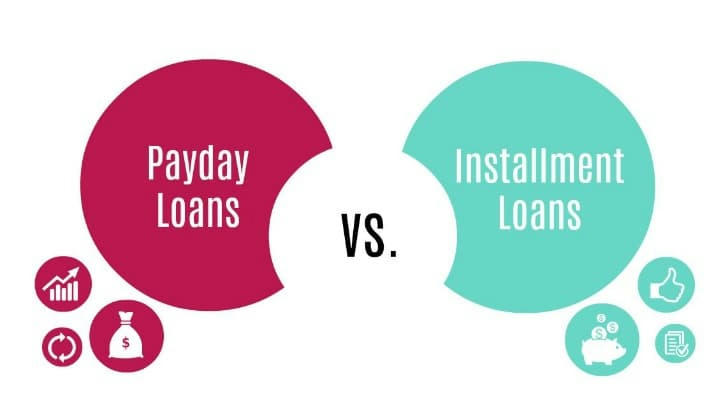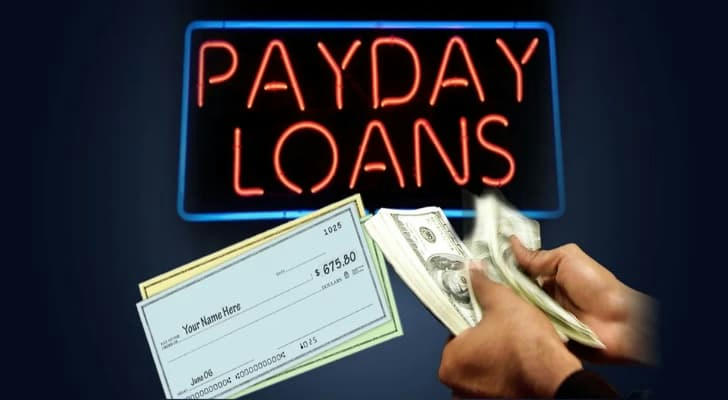Payday Loans vs. Installment Loans: The Good, Bad, and Ugly
In moments of financial stress, quick access to cash can feel like a lifeline. Two commonly advertised solutions in such situations are payday loans and installment loans. While both provide rapid funding, the similarities end there. These loan types differ drastically in repayment structure, total cost, risk level, and long-term consequences.
If you're weighing your options, this article will guide you through the pros, cons, and critical pitfalls — using real data and examples to highlight what you absolutely need to know before making a decision. 💸

✅ The Good: Fast Funding and Accessible Approval
Payday Loans: Instant Cash, Minimal Barriers
Payday loans are short-term loans meant to be repaid on your next payday. They are designed for speed and simplicity:
Loan Amount: Typically between $100 and $1,000
Funding Time: Same-day or within 24 hours
Requirements: No credit check, just proof of income and a checking account
Use Case: Often marketed for emergencies like rent, car repair, or utility bills
The ease of access is a major selling point. For people with poor or nonexistent credit history, payday lenders often represent the only available option.
Installment Loans: Predictable Repayment and Larger Limits
Installment loans are repaid in regular, fixed payments over time. They offer several key advantages:
Loan Amount: From $500 to $10,000 or more
Repayment Term: Typically 6 to 60 months
Fixed Monthly Payments: Helps with budgeting
APR Range: Usually between 6% and 36%, depending on credit profile
Flexibility: Can be used for consolidating debt, medical expenses, or major purchases
📊 Industry Insight: According to a 2022 CFPB report, about 59% of payday loan borrowers took out multiple loans within a 12-month period. In contrast, installment loan borrowers were more likely to repay on time and less likely to reborrow within that time frame.

⚠️ The Bad: Hidden Costs and the Debt Trap
Payday Loans: Small Loan, Huge Cost
Payday loans are notorious for their high fees and short repayment windows. The typical APR is around 391%, which is far above what most would consider affordable.
🔍 Example: Borrow $300, and you might owe $345 in just two weeks. If you can’t repay in full, you may have to "roll over" the loan, paying new fees each time.
Real Case – Sarah’s Story:
Sarah, a single mother in Texas, needed emergency funds to repair her car. She borrowed $500 from a payday lender. She was unable to pay the full amount back by her next paycheck and rolled it over three times. After six weeks, she had paid $375 in fees, yet still owed the original $500.
This isn’t an uncommon story. CFPB data shows that nearly 1 in 4 payday loans are reborrowed 9 times or more, trapping borrowers in a dangerous cycle.
Installment Loans: Safer, but Not Risk-Free
Installment loans generally cost less, but they aren’t free from issues:
Higher Interest for Poor Credit: Some lenders charge up to 36% APR for subprime borrowers
Late Fees: Can add up quickly and damage credit
Prepayment Penalties: Some lenders charge extra fees for paying off the loan early
Longer-Term Commitment: Borrowers may underestimate the total cost over time
Key Risk: Borrowers who stretch out repayment over many years may pay more in interest than the loan principal itself, even with moderate APRs.

😠 The Ugly: Predatory Practices and Long-Term Consequences
Payday Loans: Disguised Debt Traps
Payday lenders often operate in low-income or underserved communities and are widely criticized for predatory behavior:
Aggressive Collection Tactics: Including threats, bank overdrafts, and wage garnishments
Lack of Transparency: Many borrowers report not fully understanding the terms
Regulatory Loopholes: In some U.S. states, payday lenders operate under lenient or outdated regulations
No Credit Building: Timely repayments do not help improve your credit score
📌 CFPB Warning: In some cases, payday lenders have been known to withdraw funds multiple times in a day from borrower accounts, causing overdraft fees and checking account closures.
Installment Loans: The Hidden Fee Game
While installment loans may appear safer, some online and alternative lenders use tactics that resemble payday lenders:
“Ancillary Products”: Borrowers are sometimes charged for add-ons like credit insurance or ID protection
Membership Fees: Hidden in the fine print, these can significantly inflate the cost
Balloon Payments: Some lenders offer low monthly payments followed by a large final lump sum
Legal Gray Areas: Tribal lenders or offshore companies may not follow U.S. consumer protection laws
Real Case – James’s Trap:
James, a warehouse worker in Missouri, borrowed $2,000 through an online installment loan. The lender added $1,100 in "insurance" and "membership fees." With a 24-month term and compounded fees, James ended up repaying nearly $4,000.
📊 Head-to-Head Comparison
| Feature | Payday Loan | Installment Loan |
|---|---|---|
| Loan Amount | $100 – $1,000 | $500 – $10,000+ |
| Repayment Term | 2 – 4 weeks | 6 – 60 months |
| APR Range | 300% – 500%+ | 6% – 36% (can be higher) |
| Credit Check | Rarely required | Typically required |
| Funding Speed | Same day to 24 hours | 1 – 3 business days |
| Roll-Over Risk | Very High | Low |
| Fee Transparency | Often Low | Generally Higher |
| Credit Reporting | No | Yes (can build or hurt) |
💡 Final Thoughts: Choose With Caution
While both payday and installment loans can provide much-needed financial relief, they come with very different costs and risks.
📌 Tips for Borrowers:
Understand the full cost: Ask for the APR, total repayment amount, and a full fee breakdown before signing
Check for alternatives: Credit unions, nonprofit lenders, employer advances, or payment plans with service providers can be safer
Avoid automatic withdrawals: Opt for manual payments if possible to prevent surprise overdrafts
Review local laws: Some states limit payday loan interest or prohibit rollovers
Borrowing money is never just about the present — it affects your future finances, credit health, and peace of mind. Responsible borrowing starts with being informed. ✨

Need Help Managing Debt?
Reach out to a certified credit counselor or financial advisor if you find yourself overwhelmed. Taking action early can prevent a short-term loan from becoming a long-term burden.
